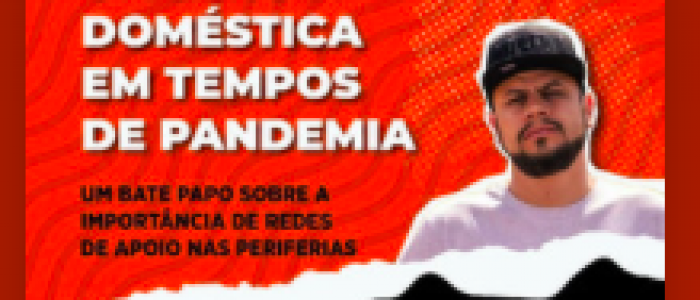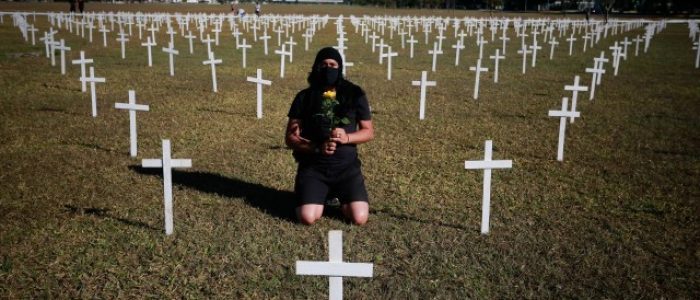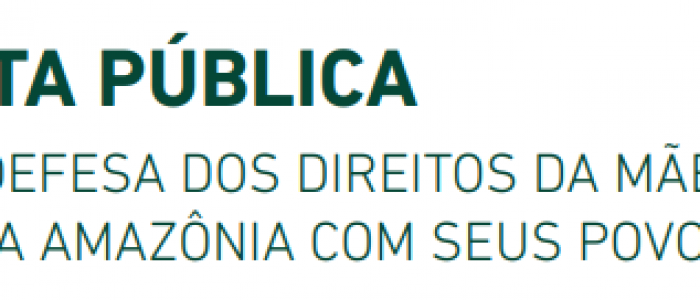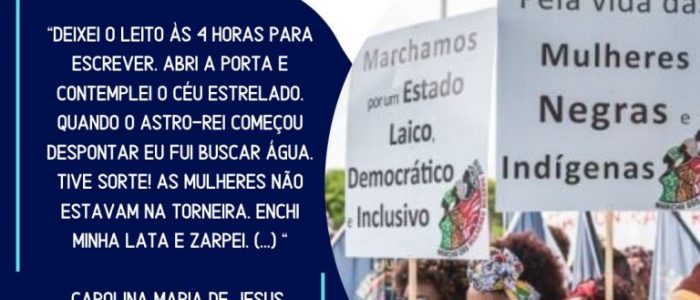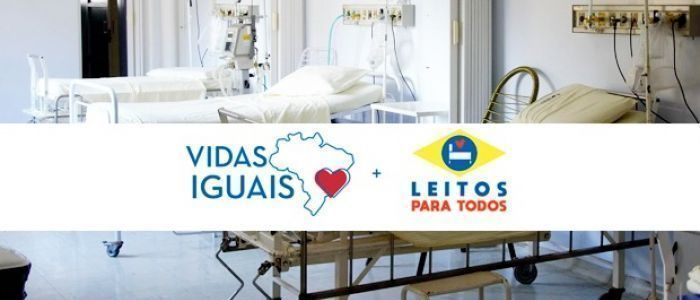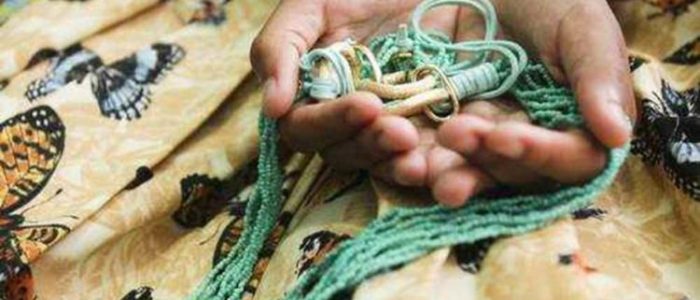Entrevista com Preto Zezé, concedida no dia 18 de abril de 2020 para o site Unidade na Diversidade, sobre o atual momento nas comunidades, as ações tomadas até agora e o que ainda precisa ser feito. Além de Preto Zezé o debate contou com o apoio de Rudá Ricci, Tânia Dornellas, Eugênio Peixoto e Osires Gianetti. Acesse aqui.
- Tipos de mobilização: Lives sobre Ativismo
Na quinta-feira, dia 14/04/2020, aconteceu a 8ª reunião virtual do NEB, Núcleo de Estudos da Burocracia. No oitavo encontro, o foco do debate foi o impacto da pandemia sobre as favelas e periferias brasileiras, bem como quais são os desafios e possibilidades de enfrentamento à crise nesses territórios. Participaram da live: Ana Mirtes, moradora e liderança comunitária da Ilha de Deus em Recife; Pedro Bento, aluno de administração pública da FGV e idealizador do Favela sem Corona; Danilo Lima, do movimento Periferia Sem Corona; Jabes Campos, membro da Rede Brasilândia Solidária. Veja aqui.
- Grupos mobilizados: Academia
- Tipos de mobilização: Ativismo Digital, Lives sobre Ativismo
O painel é uma apresentação dos artigos elaborados por estudantes do Programa de Pós-Graduação em Comunicação e Territorialidades da Ufes. O seminário tem como tema: Ativismo e Comunicação em tempos de pandemia: a atuação dos movimentos sociais. Para ver o vídeo acesse aqui.
- Grupos mobilizados: Coletivos
- Tipos de mobilização: Comunicação nas periferias
Vários coletivos também têm utilizado o whatsapp para divulgar suas notícias de maneira mais rápida e direta para a comunidade. Além de notícias sobre a pandemia também divulgam informações sobre o auxílio-emergencial, eventos culturais, política e educação. Alguns exemplos são o canal da Agência da Mural, do Periferia em Movimento e de Max Maciel. Para receber as notícias no whatsapp basta enviar uma mensagem para o número de cada coletivo, disponibilizado nas suas mídias sociais ou sites.
- Tipos de mobilização: Comunicação nas periferias
O jornal local online do Voz das Comunidades, com o programa “Covid19 nas Favelas, é produzido por Neila Marinho e apresentado pela jornalista Alana Nascimento às 19h30 no Facebook.
- Grupos mobilizados: Coletivos
- Tipos de mobilização: Comunicação nas periferias
Jovens da comunidade do Jacaré no Pernambuco criaram uma rádio comunitária, Jacaré Maluquinho, com o intuito de disseminar informações para toda as famílias vizinhas sobre a importância da prevenção contra o coronavírus.
Utilizando equipamentos simples, um notebook e um altofalante, os jovens fazem informes para toda a comunidade e divulgam o brega funk “Xô-Corona”, o seu brega-protesto. Além disso, espalharam cartazes por todo Jacaré reforçando o uso da máscara de proteção e fazem a distribuição de doações e cestas básicas.
- Grupos mobilizados: Coletivos
- Tipos de mobilização: Comunicação nas periferias
O Mini-documentário “Interrompemos a Programação (?)”, criado pelo coletivo Periferia em Movimento, começou a ser produzido em outubro de 2019. Interpelada pela pandemia no início de 2020, a produção, além de falar da importância da mídia comunitária/periférica para a formação e expressão da identidade das periferias, reflete também sobre a importância dela para o enfrentamento e exposição da situação pandêmica nas comunidades.
- Tipos de mobilização: Comunicação nas periferias
O documentário pretende colaborar com a difusão de informação nas periferias sobre prevenção, autocuidado e dados para criação de políticas públicas e outras iniciativas imediatas. Será feito a partir da visão de 5 jovens de periferias das cinco regiões do país. Os três coletivos de audiovisual que impulsionam a proposta do documentário são: Maloka Filmes formada por LGBTs da Zona Sul de São Paulo; o Centro de Comunicação e Juventude – CCJ de Recife (PE); e o Coletivo Apeirom de Ceilândia (DF).
- Grupos mobilizados: Coletivos
- Tipos de mobilização: Comunicação nas periferias
O podcast traz uma visão periférica sobre a cidade, a politica e o entretenimento e é apresentado por Max Maciel, um dos coordenadores da Rede Urbana de Ações Socioculturais (DF). Além de tratar sobre o enfrentamento ao coronavírus nas periferias, o podcast já tratou de outros temas relevantes em educação, política e cultura.
- Grupos mobilizados: Coletivos
- Tipos de mobilização: Comunicação nas periferias
Podcast do coletivo ArquePerifa produzido para entender e compartilhar diferentes vivências e impactos da COVID-19 nas periferias. É possível encontrá-lo no YouTube, no Spotify ou em versão reduzida no whatsapp.
- Grupos mobilizados: Coletivos, População Negra
- Tipos de mobilização: Comunicação nas periferias
Podcast idealizado pelo Periferia em Movimento, Alma Preta e Desenrola e Não Me Enrola. Além de podcast, também é divulgado em formato de áudio e pode ser divulgado através do whatsapp.
- Grupos mobilizados: Coletivos
- Tipos de mobilização: Comunicação nas periferias
O Voz das Comunidades, coletivo de comunicação localizado no Complexo do Alemão, lançou um aplicativo com o objetivo de minimizar a desinformação e os impactos da pandemia nas comunidades em situação de maior vulnerabilidade.
O aplicativo pode ser baixado tanto no GooglePlay (para Android) quanto na App Store (para Iphone). O app conta com três seções: AO VIVO, com informações rápidas e em tempo real; FATOS: visa o combate à desinformação, com notícias verificadas pelo time de editores com o selo de “verdade” ou “falso”; e JORNAL, que disponibiliza no aplicativo todo o conteúdo do jornal já existente.
- Grupos mobilizados: População Negra
- Tipos de mobilização: Comunicação nas periferias, Periferias Urbanas
Big Jaum postou um vídeo em seu Instagram comentando algumas Fake News recorrentes nas periferias do Rio. Acesse o vídeo nesse link.
- Grupos mobilizados: População Negra
- Tipos de mobilização: Comunicação nas periferias, Periferias Urbanas
Por todo o Brasil, foram lançados vários funks e raps com o intuito de conscientizar a população das periferias, com uma linguagem mais próxima, sobre o coronavírus e as medidas de prevenção. Alguns deles:
https://www.youtube.com/watch?v=aLWF9ms4bH0
- Tipos de mobilização: Protestos na Era da Pandemia
Movimentos populares marcaram um “grande ato” para pedir o “impeachment já” do presidente da República, Jair Bolsonaro, no momento em que o país registrava a marca de 211 mil mortes pela Covid-19. O evento ocorreu no dia 24 de janeiro de 2021 na Praça dos Três Poderes, em Brasília. Acesse aqui.
- Grupos mobilizados: Associações de classe e Sindicatos, Coletivos, Conselhos, Indígenas e Quilombolas, ONGs, População Negra
- Tipos de mobilização: Protestos na Era da Pandemia
Em 14 de janeiro de 2021, explodiram nas mídias sociais vários vídeos de profissionais da saúde, especialmente, em Manaus-AM, desesperados, denunciando a falta de bombas de oxigênio nos hospitais. Vários pacientes morreram por não ter acesso ao equipamento, não apenas aqueles contaminados com Covid-19, mas também outras enfermidades, como exemplo, há grande preocupação com os bebês prematuros que dependem do recebimento de oxigênio. Em razão disso, surgiram vários chamados de protestos partindo de diferentes grupos sociais.
- Tipos de mobilização: Protestos na Era da Pandemia
O Movimiento por Nuestros Desaparecidos en México, formado por mais de 60 coletivos mexicanos e de três países da América Central, demanda que o governo mexicano não pare as buscas dos 61 mil desaparecidos e que sejam acelerados os esforços para a identificação de mais de 37 mil corpos. No Dia das Mães (10 de maio), manifestantes tomaram as ruas mas também usaram formas de protesto digital, inclusive uma marcha digital. A tradicional Marcha de la Dignidad Nacional: Madres Buscando a sus Familiares Desaparecidos, la Verdad y la Justicia, foi feita pela primeira vez em forma digital. Participantes postaram fotos online com máscaras, nas quais estava escrito: “onde estão?”
Além disso, comunicaram-se usando hashtags como #YoApoyoParaEncontrarles, #HastaEncontrarles, #NosHacenFalta e #10DeMayoNadaQuéCelebrar. Para mais informações, ver também esta análise de Thomas Aureliani.
- Grupos mobilizados: ONGs
- Tipos de mobilização: Luto, Memória e Justiça, Protestos na Era da Pandemia
Em memória aos mortos pela pandemia, ativistas colocaram mil cruzes nos gramados da Esplanada dos Ministérios (Brasília), no domingo 28 de junho de 2020.
A ONG Rio de Paz já havia feito um protesto similar no dia 11 de junho, na Praia de Copacabana.
- Grupos mobilizados: ONGs, Organismos Internacionais
- Tipos de mobilização: Catálogos, Observatórios e Mapas, Protestos na Era da Pandemia
O Armed Conflict Location & Event Data Project (ACLED) lançou o COVID-10 Disorder Tracker, para sistematizar dados sobre protestos e conflitos relacionados à pandemia em várias regiões do mundo. Inclui desde episódios de violência contra trabalhadores da saúde até protestos contra medidas de isolamento.
- Grupos mobilizados: Indígenas e Quilombolas
- Tipos de mobilização: Manifestos Públicos
Fridays For Future Brasil é um movimento pelo enfrentamento da crise COVID-19 nas comunidades tradicionais da Amazônia. Acesse o site aqui.
- Grupos mobilizados: Organismos Internacionais
- Tipos de mobilização: Manifestos Públicos
Algumas organizações e movimentos, buscando enfrentar os impactos das políticas neoliberais nos territórios e nas comunidades rurais e urbanas da América Latina e do Caribe, lançaram proposições para minimizar os impactos do coronavírus na região. Leia aqui.
- Grupos mobilizados: Mulheres
- Tipos de mobilização: Manifestos Públicos
“Las mujeres de la Cuenca amazónica y hermanas de América Latina y el Caribe estamos enfrentando una sistemática y creciente amenaza a nuestras vidas desde el inicio de la pandemia por el Covid-19 como consecuencia de las históricas desigualdades que el sistema colonial capitalista neoliberal patriarcal busca perpetuar ante la indiferencia de los Estados para los que no son importantes nuestras vidas.” Acesse o documento completo aqui.
- Grupos mobilizados: Coletivos
- Tipos de mobilização: Manifestos Públicos
“A MESA de Articulação de Associações Nacionais e Redes de ONGs da América Latina e do Caribe, uma entidade que reúne milhares de organizações da sociedade civil, vem à público para expressar sua preocupação com a direção que as ações que vários Estados nacionais estão tomando para enfrentar a epidemia do vírus coronavírus (COVID-19) em nosso continente.” Acesse a nota completa aqui.
- Grupos mobilizados: Indígenas e Quilombolas
- Tipos de mobilização: Manifestos Públicos
“Indígenas do Brasil estão sendo dizimados pela chegada do Covid 19, associada à falta de assistência em saúde e de proteção dos territórios pelo Estado. A denúncia é feita pelas próprias comunidades tradicionais que lançam campanhas com pedidos de apoio em todo Brasil. Para dar visibilidade às iniciativas locais e facilitar doações estrangeiras, será lançada a Campanha Internacional “Covid19 – SOS Povos Indígenas do Brasil”, neste domingo (2/8).” Baixe o documento aqui.
- Grupos mobilizados: Coletivos, Igrejas e Religiões, ONGs
- Tipos de mobilização: Manifestos Públicos
Entidades e movimentos da sociedade civil lançam carta pública na qual propõem objetivos práticos atrelados a uma reflexão sobre a crise humanitária do Coronavírus. Acesse o documento completo aqui.
- Grupos mobilizados: Coletivos
- Tipos de mobilização: Manifestos Públicos
O grupo “Urbanistas contra o corona” nasce como iniciativa de pensar e produzir soluções emergenciais para equidade social e espacial dos espaços periféricos diante da epidemia. Acesse a carta aberta produzida pelo grupo aqui.
- Tipos de mobilização: Manifestos Públicos
A Frente Brasil Popular e a Frente Povo Sem Medo apontam que, diante do aprofundamento da crise nacional com a disseminação da pandemia do coronavírus, passam a empunhar a bandeira do “Fora Bolsonaro”. Acesse o artigo aqui.
- Grupos mobilizados: Mulheres, População Negra
- Tipos de mobilização: Manifestos Públicos
Carta das mulheres negras acerca das preocupações com os impactos do covid-19, assinada pela Articulação de Organizações de Mulheres Negras Brasileiras (AMNB).
- Grupos mobilizados: Associações de classe e Sindicatos, Coletivos, ONGs
- Tipos de mobilização: Manifestos Públicos
As organizações populares Central dos Movimentos Populares (CMP), Confederação Nacional de Associações de Moradores (CONAM), Movimento Nacional de Luta por Moradia (MNLM), Movimento das Trabalhadoras e Trabalhadores por Direitos (MTD), Movimento de Luta dos Bairros e Favelas (MLB) e União Nacional por Moradia Popular (UNMP) propõem a adoção de algumas medidas imediatas a fim de superar a crise econômica e social no país. Confira aqui.
- Grupos mobilizados: Coletivos
- Tipos de mobilização: Manifestos Públicos
A Plataforma dos Movimentos Sociais pela Reforma do Sistema Político, que reúne centenas de organizações e movimentos de todo o país, reivindica algumas medidas imediatas, como o descongelamento do gasto social e a suspensão e reestruturação das dívidas. Confira as reivindicações nesse link.
- Grupos mobilizados: Coletivos
- Tipos de mobilização: Manifestos Públicos
A Aliança pela Alimentação Adequada e Saudável ao lado de mais de 80 organizações, coletivos e entidades da sociedade civil publicaram um apelo para que o direito à saúde e à alimentação de brasileiros e brasileiras seja respeitado, protegido e garantido, no contexto do combate ao novo coronavírus. Clique aqui para acessar o documento.
- Grupos mobilizados: Academia
- Tipos de mobilização: Manifestos Públicos
A Sociedade Brasileira para o Progresso da Ciência (SBPC), junto a suas Secretarias Regionais e Sociedades Científicas Afiliadas, somam forças a entidades de todo o País ligadas à CT&I para a realização da Marcha Virtual pela Ciência no Brasil no dia 07 de maio. Com atividades transmitidas pelas redes sociais ao longo do dia, o objetivo da manifestação é chamar a atenção para a importância da ciência no enfrentamento da pandemia de Covid-19 e de suas implicações sociais, econômicas e para a saúde das pessoas. Acesse aqui.
- Grupos mobilizados: Coletivos
- Tipos de mobilização: Comunicação, Manifestos Públicos
Colunista afirma que é preciso fortalecer o SUS, investindo recursos de forma prioritária na saúde pública, especialmente nas periferias das cidades – onde o impacto da Covid-19 é maior. Leia aqui a coluna de Raimundo Bonfim sobre o assunto.
- Grupos mobilizados: Coletivos
- Tipos de mobilização: Manifestos Públicos
O debate acerca do sistema de saúde público e as desigualdades tem sido amplificado na sociedade. Por conta disso, está marcado para o dia 13 de maio o lançamento do manifesto da Frente Unificada por políticas públicas solidárias que garantam, durante a pandemia, o acesso universal e igualitário aos serviços hospitalares através do SUS. O documento é apoiado pela Abrasco e mais de 40 entidades e movimentos sociais e traz cinco medidas necessárias para a “urgente de construção de uma resposta eficaz e solidária à epidemia, que salve a maior quantidade de vidas possível, propomos”. Confira a íntegra do manifesto aqui.
- Grupos mobilizados: Coletivos
- Tipos de mobilização: Manifestos Públicos
As campanhas “Vidas Iguais” e “Leitos Para Todos” se uniram para mobilizar a sociedade e pressionar o poder público para garantir acesso universal e igualitário a todos por meio do Sistema Único de Saúde. Acesse aqui.
- Grupos mobilizados: Coletivos, Indígenas e Quilombolas, Mulheres, População Negra
- Tipos de mobilização: Manifestos Públicos
“A Campanha Nacional Todas as Vidas Valem foi lançada pelo Movimento Nacional de Direitos Humanos (MNDH) no dia 15 de maio de 2020. A Campanha tem por objetivo principal: mobilizar as organizações de direitos humanos para a garantia dos direitos humanos no contexto da Covid-19. Como objetivos específicos, a Campanha pretende: a) organizar a solidariedade para a atenção aos grupos e segmentos com mais necessidade protetiva; b) promover ações de monitoramento das violações de direitos humanos no contexto da pandemia; c) realizar ações formativas para o fortalecimento das organizações de direitos humanos. […]”. Confira o documento completo aqui.
- Grupos mobilizados: Coletivos
- Tipos de mobilização: Manifestos Públicos, Petições Online
“O Brasil, suas instituições, seu povo não podem continuar a ser agredidos por alguém que, ungido democraticamente ao cargo de presidente da República, exerce o nobre mandato que lhe foi conferido para arruinar com os alicerces de nosso sistema democrático, atentando, a um só tempo, contra os Poderes Legislativo e Judiciário, contra o Estado de Direito, contra a saúde dos brasileiros, agindo despudoradamente, à luz do dia, incapaz de demonstrar qualquer espírito cívico ou de compaixão para com o sofrimento de tantos.” Acesse aqui o abaixo-assinado da campanha.
- Grupos mobilizados: Igrejas e Religiões, População Negra
- Tipos de mobilização: Manifestos Públicos
“Somos de uma tradição que não separa a razão da emoção ou a luta política da subjetividade de ser e viver em plenitude. Para nós que professamos a fé da solidariedade, da compaixão, do afeto e da resistência não há como silenciar a voz no período mais trágico que vivemos desde a escravização do nosso povo. A história de nosso país foi edificada sobre o sangue negro. É nossa obrigação ética e moral enfrentarmos a política de morte do desgoverno Bolsonaro, em honra à memória de lutas e resistência de nossas heroínas e heróis negras e negros.”. Acesse o texto aqui.
- Tipos de mobilização: Manifestos Públicos, Periferias Urbanas
Dezenas de entidades se reuniram para elaborar 13 propostas de ações imediatas e estruturais para enfrentamento da pandemia de Covid-19, direcionadas prioritariamente para habitantes de territórios populares – nas periferias, nos assentamentos informais, nas ocupações – e também para a população em situação de rua e outros grupos sociais vulneráveis. Acesse aqui.









